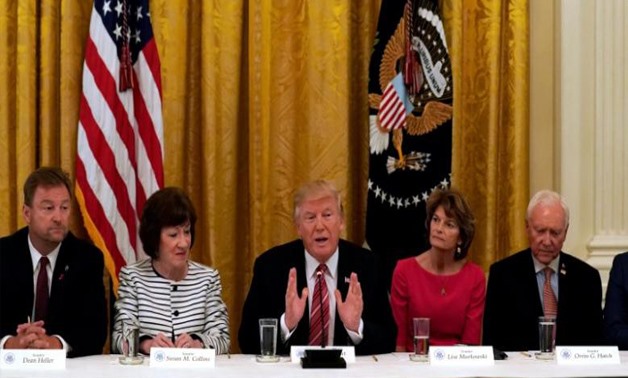
U.S. President Donald Trump meets with Senate Republicans about healthcare in the East Room of the White House in Washington, U.S., June 27, 2017. Trump is flanked by Senators Susan Collins (R-ME) and Sen. Lisa Murkowski (R-AK). REUTERS/Kevin Lamarque
Washington - 28 June 2017:US Republicans eager to repeal "Obamacare" suffered a deeply embarrassing setback Tuesday when shrinking support forced them to postpone votes on their controversial health care overhaul, one of President Donald Trump's top priorities.
With the Senate bill delayed by a few weeks and maybe more, the timeline of the effort -- and the overall viability of a years-long bid to dismantle Barack Obama's Affordable Care Act (ACA) in favor of a Republican replacement -- was thrown into question.
Senate Majority Leader Mitch McConnell acknowledged he did not have the votes, after a non-partisan forecast projected the bill would swell the ranks of the uninsured by 22 million by 2026, as compared to current law.
McConnell said party members would "continue the discussions" in a bid to overcome internal divisions.
"Consequently, we will not be on the bill this week, but we're still working toward getting at least 50 people in a comfortable place."
The ideological differences between conservatives and moderates were so stark that it was clear leadership did not even have the 50 votes in the 100-member chamber needed to simply begin debate on the bill.
But McConnell insisted the measure was far from dead. After the announcement, Republican senators trooped down to the White House for a special meeting with Trump, who made it clear that the pressure was on.
"We're getting very close. But for the country, we have to have health care, and it can't be Obamacare which is melting down," Trump said, as dozens of lawmakers sat grim-faced around a White House conference table.
"We need to talk, we need to see what we can do," the president added.
The gathering is reminiscent of the health care effort in the House, when Trump hosted Republican congressmen after Speaker Paul Ryan was forced to pull the first version of the House bill -- presumably to apply pressure.
A tweaked version then passed the House, with a handful of Republicans opposing it. Trump turned around and branded the House bill "mean," and wanted a Senate bill with more "heart."
The Senate delay is a huge blow to Trump and Republican lawmakers who have spent the last seven years plotting an end to the ACA, commonly known as Obamacare.
It also highlights the deep ideological divides within the party over how to improve the health care system while not cutting millions of Americans out of insurance coverage.
"It's difficult to see how tinkering is going to satisfy my fundamental concerns about the bill," Senator Susan Collins, a Republican moderate, told reporters.
The Senate draft would save some $321 billion in federal spending over the 2017-2016 period, according to the Congressional Budget Office (CBO).
But it would balloon out-of-pocket medical expenses for the working poor and those age 50 to 64.
The bill provides billions in tax cuts to insurance companies and the wealthy, while allowing states to drop several currently mandated benefits, such as maternity care and hospital services.
It would abolish the requirement for most Americans to have health insurance.
The bill would also delay cuts to the Medicaid program, although longterm cuts to the program would be severe.
Republicans want to gradually cap Medicaid expenditure -- which would mean 15 million people by 2026 would lose their benefits through the program, according to the CBO report.
The bill also maintains for two years the tax credits included in Obamacare to help lower-income Americans purchase coverage, but eventually transitions that program into one which provides fewer subsidies.
Conservatives say the Senate bill does not go far enough, and would still put too heavy a burden on government coffers. Moderates say they can't vote for a bill that would see the number of uninsured Americans balloon to pre-Obamacare levels.
"It's the biggest signature issue we have. And it's the biggest promise we've ever made in the modern era," House Speaker Paul Ryan said Tuesday on Fox News, recalling the constant campaign pledges by Republicans to repeal and replace Obamacare.
Republicans hold 52 Senate seats. They need at least 50 votes for passage, as Vice President Mike Pence would break the tie in favor of the measure.
But at least nine Republicans senators have now said they oppose the bill as is, including Rob Portman of Ohio and Shelly Moore Capito of West Virginia.
Top Senate Democrat Chuck Schumer said Americans would be better off if lawmakers jettisoned the Republican bill and sat down together in a bipartisan effort to improve Obamacare.
"No matter how the bill changes around the edges, it is fundamentally


Comments
Leave a Comment